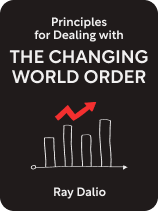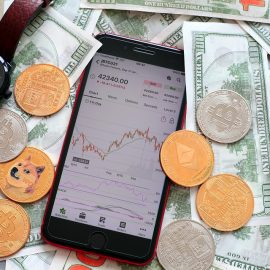

This article is an excerpt from the Shortform book guide to "Principles for Dealing with the Changing World Order" by Ray Dalio. Shortform has the world's best summaries and analyses of books you should be reading.
Like this article? Sign up for a free trial here.
What does the future hold for the world? How can we prepare for uncertain times?
In Principles for Dealing With the Changing World Order, Ray Dalio offers insights on global trends and power shifts. He examines four key factors: human inventiveness, debt cycles, sociopolitical dynamics, and geopolitical tensions—with a focus on the evolving relationship between the US and China.
Read on to discover Ray Dalio’s predictions and strategies for navigating turbulent times.
Ray Dalio’s Predictions & Advice
We’ll discuss Ray Dalio’s predictions regarding the United States and China as the two major powers to watch on the global stage, and we’ll lay out his suggestions for how to prepare for an ultimately uncertain future.
The US & China: 4 Factors to Watch
To anticipate what’s next in the world’s cycles, Dalio asserts that you must watch for the signals that indicate what major shifts will most likely occur. He calls back to four key concepts: human inventiveness and the three dimensions of the main pattern.
Factor #1: Human inventiveness: Given the many spectacular inventions of the past—from electricity to vaccines—and due to advances in AI and quantum computing, Dalio is optimistic about human progress continuing. The US and China will lead this progress, as both have productive, innovative workforces and economies.
Factor #2: Debt and financial cycles: Dalio says the US Dollar is in decline as a reserve currency, as the US is late in its cycle as a major power. High US debt will likely lead to the dollar weakening, whereas China has moderate debt and the renminbi (China’s currency) is on the rise.
Factor #3: Sociopolitical cycles: According to Dalio, the US shows strong signs of internal turmoil and may be heading toward more serious fragmentation. Increasing levels of political polarization, values gaps, and financial uncertainty mean that the US could descend into a period of possibly violent restructuring—Dalio suggests a 30% chance of a civil war-like event within 10 to 15 years.
However, he also argues that the US has weathered more political turmoil than most empires do, having persisted through 250 years that saw a civil war, multiple major depressions and world wars, and other major civil conflicts. While Dalio says it would be difficult—given the US’s high international debt, weakened political standing, and high levels of internal conflict—the country could manage by recognizing the decline and aiming for a nonviolent restructuring.
China, on the other hand, is presently in a period of peace and prosperity. They have relatively strong economic fundamentals (low debt, high productivity) and a strong civil society with low conflict over values and wealth distribution. While he doesn’t go into great detail, Dalio expresses optimism about China.
Factor #4: Geopolitical cycles: In the global order, Dalio explains that the US and China are the two major powers to watch. He contends that they’re engaged in four of the five types of war: Economic, technological, geopolitical, and capital conflicts. For instance, both countries have long been engaged in tense diplomacy regarding activities in the South China Sea. These conflicts will intensify as China becomes more competitive as a global power.
Additionally, the US military remains the strongest in the world. However, China’s is nearly comparable and is growing, particularly across Asia—from the Koreas and Southeast Asia to India and Pakistan. Dalio estimates a 35% chance of a hot war within 10 years, and he says it would likely break out over Taiwan, a major pain point between the two powers. If we’re lucky, he says the tenet of “mutually assured destruction” may prevent outright military conflict on a global scale.
Dalio on How to Prepare for the Future
Though he expresses confidence in the above predictions, Dalio also recommends learning how to deal with what you don’t know. He stresses that all of these indicators and predictions are, in the end, educated guesses, and that we can’t predict everything. While history does “rhyme” in some ways, it’s also full of unpredictable happenings, such as the industrial and microcomputing revolutions as well as major political revolutions, like the movement away from feudalism and toward modern democracy.
To deal with unpredictability, Dalio says you must expect to be surprised and, when you are, be ready to adapt. While he doesn’t explain exactly how to do this (that’s the difficulty with unpredictable events), he advises that you stay aware of major political and economic trends around the world so that you can adapt when major events begin to suggest themselves.
(Shortform note: Here, Dalio’s thinking dovetails with that of Nassim Nicholas Taleb, who writes in The Black Swan that history is rife with unpredictable events that massively impact human society. Black Swans, Taleb says, are unpredictable by nature—they’re the things that we don’t know we don’t know. Even experts, he says, struggle to predict them more accurately than regular people.)
In addition to good guesses, Dalio explains how to make good decisions in the face of uncertainty:
- Prepare for the worst. Based on the probable futures his model predicts, Dalio stashes backup funds in safe accounts or in physical stores like precious metals. This ensures he can provide for his family if things go south politically, economically, or otherwise.
- Diversify your bets. Develop a portfolio that isn’t limited by boundaries between industries or borders—invest in multiple countries and in multiple sectors of the economy. Be prepared to move your money across borders if need be.
- Learn from the smartest people you know. Look for others who anticipate the future, and discuss your principles and ways of thinking with them. This way, you’ll enrich one another’s mental models and can improve your bets together.
(Shortform note: Continuing the parallels between Dalio and Taleb’s view, Taleb offers similar yet distinct strategies to prepare for uncertainty. Chiefly, he recommends that you don’t bother trying to predict the future. Instead, he says you can prepare for the effects of Black Swan events by being proactive and sociable (others may be able to help you), which will increase your chances of benefiting from positive Black Swans, and by balancing a small amount of risky investments with a large amount of safer investments, which will create the potential for big wins but keep your money generally safe. He also suggests distinguishing between “positive” and “negative” Black Swan areas, so that you can decide where best to take risks with your money.)
Last, Dalio gives a general recommendation that we bet on things getting better. While major periods of downturn and destruction could happen in our lifetimes—wars, natural disasters, and major restructurings of the world’s systems have all been common in the past—things also tend to improve. Human life has steadily improved throughout history, Dalio says, and human inventiveness will continue to drive that positive evolution.
(Shortform note: One prominent expert who shares Dalio’s view is Steven Pinker, a Harvard professor and author of books including Enlightenment Now, in which he argues that the quality of life for humans today is better than it’s ever been. More specifically, he argues that the progressive ideals and values that emerged during the European Enlightenment of the 17th and 18th centuries have revolutionized human civilization and will continue to improve life around the world.)
Exercise: Practice Preparing for What Could Happen
Dalio suggests a variety of possibilities for the future, some concerning and some promising. Below, reflect on your priorities and practice preparing for the uncertain future.
- Given Dalio’s predictions that a hot war might break out between the US and China, or that the US may decline further into civil disorder, how might you prepare for the worst, according to Dalio?
- Assuming the opposite—that things will go more-or-less well in the coming decade—how could you manage your financial situation or investments to take advantage of the potentially changing world order?
- Last, reflect on how you might improve your mental models for navigating life, business, and investing: Following Dalio’s final piece of advice, who might you reach out to for a conversation about clearer thinking? (For instance, you might have a work colleague who’s interested in investing, decision-making, or mental models.)

———End of Preview———
Like what you just read? Read the rest of the world's best book summary and analysis of Ray Dalio's "Principles for Dealing with the Changing World Order" at Shortform.
Here's what you'll find in our full Principles for Dealing with the Changing World Order summary:
- How to use patterns in world history to make better decisions today
- What may happen in the near future for the United States and China
- Why humans are stuck in a competition for wealth and power






